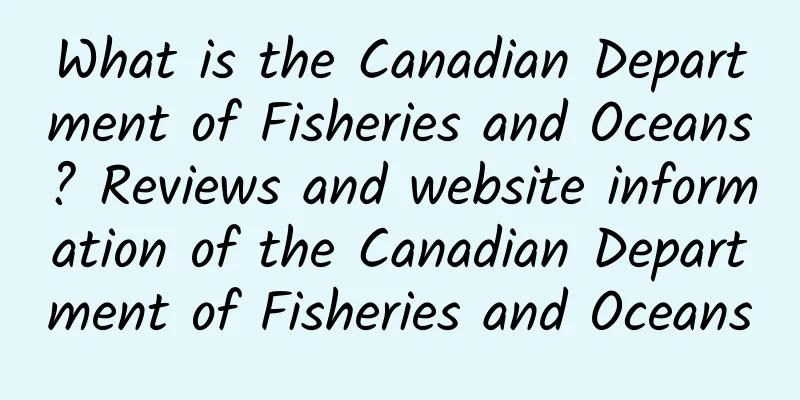What is the Canadian Department of Fisheries and Oceans? Reviews and website information of the Canadian Department of Fisheries and Oceans

|
What is the website of Fisheries and Oceans Canada? Fisheries and Oceans Canada (English: Fisheries and Oceans Canada, French: Pêches et Océans Canada) is a Canadian government department established in 1868. It is mainly responsible for the protection and sustainable use of Canada's fishery resources and the provision of safe, effective and environmentally sound marine services. Website: www.dfo-mpo.gc.ca Fisheries and Oceans Canada: A pioneer in protecting nature and sustainable developmentCanada is a country rich in natural resources. Its vast coastline and vast waters make it an important player in global fisheries and ocean management. In order to protect these precious resources and ensure their sustainable use, the Canadian government has established the Department of Fisheries and Oceans (DFO). As one of the oldest government departments in Canada, DFO has been committed to maintaining ecological balance, promoting economic development and ensuring public safety since its establishment in 1868. This article will take a closer look at the role of Fisheries and Oceans Canada, its mission, achievements and its role in the international community. We will also learn how the department responds to global challenges such as climate change, biodiversity loss and overfishing through scientific research, policy making and international cooperation. History and responsibilities of the Department of Fisheries and OceansThe Department of Fisheries and Oceans of Canada was established in 1868 as the Fisheries Branch, which was responsible for managing Canada's fisheries. Over time, the department expanded its responsibilities to include a wider range of marine affairs. Today, the Department of Fisheries and Oceans' mission includes:
The Department of Fisheries and Oceans is not limited to domestic affairs, but is actively involved in international treaties and agreements, such as the United Nations Convention on the Law of the Sea (UNCLOS) and the Convention on International Trade in Endangered Species of Wild Fauna and Flora (CITES), to ensure the wise use of the world's marine resources. Official website: www.dfo-mpo.gc.caThe official website of the Department of Fisheries and Oceans Canada ( www.dfo-mpo.gc.ca ) is an important channel for the public to obtain information. The website provides a wealth of resources and tools to help users understand the department's activities, policies and research results. The following are the main functions and contents of the website:
By visiting the official website, the public can better understand Canada's efforts in marine management and ecological protection and participate in related activities. Sustainable management of fishery resourcesAs one of the world's largest fishery producers, Canada's fishery resources are vital to its economic and social development. However, factors such as overfishing, climate change and environmental pollution pose a serious threat to these resources. To this end, the Department of Fisheries and Oceans has taken a series of measures to achieve sustainable management of fishery resources:
These measures not only help protect fish populations, but also provide a long-term and stable source of income for fishermen and related industries. Marine environmental protection and climate change responseAs the impacts of global climate change become increasingly apparent, marine ecosystems are facing unprecedented challenges. Issues such as rising temperatures, increasing acidification and rising sea levels have profound impacts on both marine life and human society. Fisheries and Oceans Canada plays a key role in addressing these challenges:
Through these efforts, the Department of Fisheries and Oceans hopes to mitigate the impacts of climate change on marine ecosystems in the coming decades and ensure their long-term health and stability. Scientific research and technological innovationScientific research and technological innovation are at the heart of Fisheries and Oceans Canada's work. The department has world-class scientists and researchers who have made significant achievements in a number of areas:
In addition, the Department of Fisheries and Oceans actively collaborates with academia, industry and other government departments to promote interdisciplinary research and technological innovation. This collaboration not only improves the quality and impact of research, but also promotes the dissemination and application of knowledge. Public Participation and EducationPublic participation and education are key to achieving the Sustainable Development Goals. Fisheries and Oceans Canada encourages public participation in marine conservation and resource management in a variety of ways:
Through these initiatives, the Ministry of Fisheries and Oceans hopes to inspire public enthusiasm for marine conservation and cultivate more citizens who care about sustainable development. International cooperation and global contributionAs a responsible global citizen, Canada actively participates in international affairs and promotes the sustainable management of global marine resources. The Department of Fisheries and Oceans plays an important role in the following areas:
Through these international collaborations, Canada has not only demonstrated its leadership in global ocean governance, but also made important contributions to achieving the United Nations Sustainable Development Goals (SDGs). Future OutlookAlthough Fisheries and Oceans Canada has made remarkable achievements over the past century, the department still needs to work hard to face increasingly complex global challenges. Future work priorities include:
Through these efforts, Fisheries and Oceans Canada will continue to play an important role globally and make greater contributions to achieving sustainable development and protecting our planet. ConclusionCanada's Department of Fisheries and Oceans is not only the core agency for the country's natural resource management, but also an important participant in global ocean governance. Through scientific management, technological innovation and international cooperation, the department has successfully protected Canada's fishery resources and marine ecosystems, while providing valuable experience and demonstration for global sustainable development. In the future, we have reason to believe that the Department of Fisheries and Oceans will continue to uphold its mission and create a more prosperous and healthy blue planet for future generations. |
<<: How is Sidley Austin LLP? Reviews and website information of Sidley Austin LLP
>>: How is Windows? Windows reviews and website information
Recommend
How is the German Hamburger Evening News? German Hamburger Evening News review and website information
What is the website of Hamburger Abendblatt? The o...
How to eat dried figs How to eat dried figs
Many people have eaten figs. They know that figs ...
How to cook Hericium erinaceus at home
Hericium erinaceus is a common fungus vegetable i...
Can you bring cosmetics on a plane? What can't you bring on a plane?
Nowadays, airplanes have become the most convenie...
How to eat ginseng fruit with pictures and taboos of eating ginseng fruit
Ginseng fruit is a kind of eggplant and a special...
The pros and cons of drinking red wine every day
Red wine and tea are both very popular drinks now...
What is The Nordic Times like? The Nordic Times review and website information
What is the Nordic Times? The Nordic Chinese Times...
Nutritional value of edible cactus
Cactus is a very environmentally friendly green f...
Ingredients and preparation of ginseng, lotus seeds and black fungus porridge
Different ingredients can be combined with white ...
How to eat cherries Tutorial on how to eat cherries
Cherry is a small, rosy, nutritious and healthy f...
The effects and functions of sorghum and the benefits of eating sorghum
Sorghum is a common food in our lives. It is the ...
Nutritional value of mixed vegetables
How much do you know about the nutritional value ...
How is Pampers? Pampers reviews and website information
What is Pampers? Pampers is a baby hygiene product...
What is Russell Ella Crowe like? Russell Ella Crowe reviews and website information
What is Russell Ira Crowe's website? Russell I...
Corn Armyworm Control Tips
Today I will tell you about the prevention and co...









